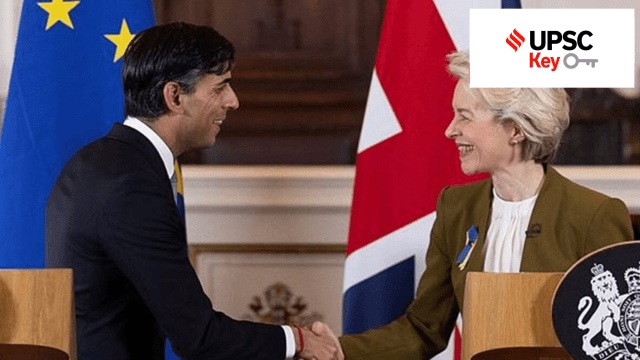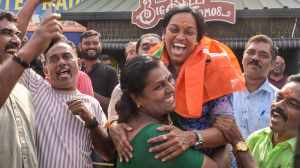
Manufacturing pulls down GDP growth to 4.4%
Syllabus:
Preliminary Examination: Economic and Social Development
Mains Examination: General Studies III: Indian Economy and issues relating to planning, mobilization, of resources, growth, development and employment.
Key Points to Ponder:
• What’s the ongoing story-India’s Gross Domestic Product (GDP) growth slowed to a three-quarter low of 4.4 per cent in October-December 2022-23 primarily due to a 1.1 per cent contraction in manufacturing, along with weaker private consumption demand and government expenditure, according to data released by the National Statistical Office (NSO) on Tuesday.
• What exactly National Statistical Office (NSO) data said?
• For Your Information-For the full financial year 2022-23, NSO has retained the growth estimate at 7 per cent in the second advance estimates. Revised data for previous financial years was also released which saw growth rate for financial year 2021-22 being revised up by 40 basis points to 9.1 per cent from 8.7 per cent earlier. There was upward revision for Covid-period too with GDP for 2020-21 now estimated at (-) 5.8 per cent instead of (-) 6.6 per cent earlier.
The fourth quarter GDP estimate at 5.1 per cent is way higher than the projection of 4.2 per cent for Q4 given by the Reserve Bank of India (RBI) in its December policy review (with FY23 growth estimate at 6.8 per cent).
• What do understand by Private Final Consumption Expenditure (PFCE) and Government Final Consumption Expenditure (GFCE)?
• What is Gross domestic product (GDP)?
• GDP-How it is Calculated?
• Gross domestic product (GDP) and Gross National Product (GNP)-Key Differences
• ‘Nominal’ GDP and ‘Real’ GDP-What is the difference?
• Meaning of “Double Deflation” in the context of GDP Calculation?
• What is National Statistical Office (NSO)?
Story continues below this ad
• What is the main function of National Statistical Office (NSO)
Other Important Articles Covering the same topic:
📍GROWING PAINS
No SC relief for Sisodia, he resigns from govt, says charges a conspiracy
Syllabus:
Preliminary Examination: Indian Polity and Governance-Constitution, Political System, Panchayati Raj, Public Policy, Rights Issues, etc.
Mains Examination: General Studies II: Indian Constitution—historical underpinnings, evolution, features, amendments, significant provisions and basic structure.
Key Points to Ponder:
Story continues below this ad
• What’s the ongoing story– IN A surprise move Tuesday evening, Delhi’s Deputy Chief Minister Manish Sisodia, who is in CBI custody, and jailed minister Satyendar Jain tendered their resignations to Chief Minister Arvind Kejriwal. The resignations, which were accepted by Kejriwal, have been sent to the Office of the Lieutenant Governor, from where they will be forwarded to the President. The development came hours after the Supreme Court refused to entertain Sisodia’s plea challenging his arrest by the CBI in the excise policy case. The agency had arrested Sisodia on Sunday after eight hours of questioning. The next day, a CBI court granted the agency five-day custody of the Deputy CM, who also holds the crucial education and finance portfolios.
• In the Supreme Court earlier, a bench of Chief Justice of India D Y Chandrachud and Justice P S Narasimha disapproved of Sisodia approaching the apex court directly under Article 32 of the Constitution-Why?
• What is Article 32 of the Constitution?
• What is the triple test to satisfy the need for arrest?
• “There is also a problem of basic structure. Without a (notice under) 41A, demonstration of the necessity of arrest against political leaders of several political parties, then there is the issue of a non-level, non-democratic playing field. That will affect the basic structure”- What do you understand from the given paragraph?
• What is an individual’s right against self-incrimination?
Story continues below this ad
• Do You Know-Article 20(3) in Part III (Fundamental Rights) of the Indian Constitution says, “No person accused of any offence shall be compelled to be a witness against himself.” The right to be presumed innocent until proven guilty, and the right to remain silent in an interrogation essentially flow from this constitutionally guaranteed right against self-incrimination. This right also ensures that police cannot coerce anyone to confess to a crime, and obtain a conviction based on that confession.
• How does the right against self-incrimination apply in criminal cases?
• What happened in Manish Sisodia’s case?
• What was the reasoning of the court?
• On what grounds did the SC reject Sisodia’s plea on Tuesday?
Other Important Articles Covering the same topic:
📍Sisodia case: how the right against self-incrimination works
EXPRESS NETWORK
Writer Vinod Kumar Shukla wins PEN America award
Syllabus:
Preliminary Examination: Current events of national and international importance.
Mains Examination: General Studies I: Indian culture will cover the salient aspects of Art Forms, literature and Architecture from ancient to modern times.
Key Points to Ponder:
Story continues below this ad
• What’s the ongoing story--Vinod Kumar Shukla, at 87, has won the PEN America award for lifetime achievement in literature, one of the most coveted literary prizes worldwide, after decades of composing acclaimed novels like Naukar Ki Kameez (1979) and poetry collections like Sab Kuch Hona Bacha Rahega (1992).
• Personality in News- Vinod Kumar Shukla
• Do You Know- Vinod Kumar Shukla, whose works incorporate magic-realist elements and have won the Sahitya Akademi award and the Atta Galatta–Bangalore Literature Festival Book Prize, was born on January 1, 1937 in Rajnandgaon, Chhattisgarh (then Madhya Pradesh). His first published work was a poetry collection Lagbhag Jai Hind (1971), followed by Vah Aadmi Chala Gaya Naya Garam Coat Pehankar Vichar Ki Tarah (1981).
• What is PEN America?
Other Important Articles Covering the same topic:
📍Over 100 writers from India and the diaspora come together in an anthology to celebrate India at 75
EXPRESS NETWORK
Report: Karnataka, Gujarat making most progress in shift to clean power
Syllabus:
Story continues below this ad
Preliminary Examination: General issues on Environmental ecology, Bio-diversity and Climate Change – that do not require subject specialization.
Mains Examination: General Studies III: Conservation, environmental pollution and degradation, environmental impact assessment.
Key Points to Ponder:
• What’s the ongoing story– Karnataka and Gujarat are among the major states making the most progress in transition to clean electricity, according to a new report on India’s energy transition, prepared by the Institute for Energy Economics and Financial Analysis (IEEFA) along with EMBER. The report — ‘Indian States’ Energy Transition’ — released on Monday has analysed 16 states, which together account for 90% of India’s annual power requirement. The analysis has tracked four dimensions (see graphic). Based on this analysis, the report devises a scoring system — States’ Electricity Transition, or SET — which measures performance of different states in the transition to clean electricity.
• Know the key highlights of the report ‘Indian States’ Energy Transition’
Story continues below this ad
• For Your Information-Karnataka is the only state among the 16 analysed that scored well across all four dimensions of clean electricity transition identified in this study. It also has conducive policies and political commitments for a smoother transition, the study noted. Gujarat was a little behind Karnataka in terms of decarbonising its electricity sector. Haryana and Punjab have shown promising preparations and implementations for electricity transition, the report stated.
• What is ‘Transition to clean electricity’?
• What is India’s energy transition plan?
• What is India’s New Renewables Energy Target?
• How can net zero be achieved?
• Public-Private partnership frameworks to achieve ‘net zero’-issues and challenges
• India’s emission Status-Present Scenario
Other Important Articles Covering the same topic:
📍What India needs for a just energy transition
📍India, Denmark can show it’s possible to deliver on climate goals: minister
Centre set to invite state views again on Punchhi panel
Syllabus:
Story continues below this ad
Preliminary Examination: Indian Polity and Governance-Constitution, Political System, Panchayati Raj, Public Policy, Rights Issues, etc.
Mains Examination:
• General Studies II: Appointment to various Constitutional posts, powers, functions and responsibilities of various Constitutional Bodies.
• General Studies II: Functions and responsibilities of the Union and the States, issues and challenges pertaining to the federal structure, devolution of powers and finances up to local levels and challenges therein
Key Points to Ponder:
• What’s the ongoing story- Nearly five years after announcing that its work on the Punchhi Commission’s report on Centre-state relations is “complete”, the Union Ministry of Home Affairs (MHA) has decided to start the process of seeking the states’ comments on the issue afresh.
The matter recently came to light in Parliament through a reply given by the MHA to an unstarred question asked by Sukhendu Sekhar Ray, the Rajya Sabha member of the Trinamool Congress (TMC).
• Punchhi Commission-Know the key details
• For Your Information-The Punchhi Commission was constituted by the then Manmohan Singh-led UPA government in April 2007 under the chairmanship of former Chief Justice of India (CJI) Madan Mohan Punchhi. In 2010, the Commission submitted its report to the Centre in seven volumes. Among its recommendations were those pertaining to clipping of the Governors’ wings.
• What important recommendations did the Punchhi Commission make?
• Do You Know-The Punchhi Commission also recommended that it is “necessary to provide for impeachment of the Governor on the same lines as provided for impeachment of the President in Article 61 of the Constitution” and that the “Governor should not be burdened with positions and powers which are not envisaged by the Constitution and which may expose the office to controversies or public criticism” like the posts of the Chancellors of the universities.
• What Punchhi Committee, constituted in 2007 on Centre-state relations said on selection the Governor?
• The Punchhi Committee recommended deleting the “Doctrine of Pleasure” from the Constitution-What is “Doctrine of Pleasure”?
Other Important Articles Covering the same topic:
📍Explained: Governor’s powers, friction with states, and why this happens often
Previous Year Prelims Questions Based on same theme:
📍Which one of the following suggested that the Governor should be an eminent person from outside the State and should be a detached figure without intense political links or should not have taken part in politics in the recent past? (Please refer Prelims 2019 GS question Paper for complete question)
EXPLAINED
What is Windsor Framework, which will replace the Northern Ireland Protocol?
Syllabus:
Preliminary Examination: Current events of national and international importance.
Mains Examination: General Studies II: Effect of policies and politics of developed and developing countries on India’s interests, Indian diaspora.
Key Points to Ponder:
• What’s the ongoing story- The UK government under Prime Minister Rishi Sunak Monday (February 27) reached a landmark deal with the European Union (EU) on post-Brexit trade rules that will govern Northern Ireland. The ‘Windsor Framework’ will replace the Northern Ireland Protocol, which had proved to be among the thorniest of Brexit fall-outs, creating problems both economic and political.
• Quick Recall-The UK government says it has reached a deal with the European Union to resolve their long-running trade dispute over Northern Ireland.
Prime Minister Rishi Sunak said he and European Commission President Ursula von der Leyen would hold a news conference on Monday. The government had previously said that would only happen if a deal was struck.
• The Northern Ireland Protocol problem-Know in detail
• Map Work-Northern Ireland
• For Your Information-The two Irelands have had a long history of conflict, with a hard-fought peace secured only in 1998 under the Belfast Agreement, also called the Good Friday agreement. Fiddling with this border was thus considered too dangerous, and it was decided the checks would be conducted between Great Britain (England, Scotland and Wales) and Northern Ireland (which together with Great Britain forms the United Kingdom). This was called the Northern Ireland Protocol. Under the protocol, Northern Ireland remained in the EU single market, and trade-and-customs inspections of goods coming from Great Britain took place at its ports along the Irish Sea.
• What the Windsor Framework proposes?
• What is Stormont Brake?
• How have stakeholders reacted
Other Important Articles Covering the same topic:
📍UK government inks deal with EU to resolve trade dispute with Northern Ireland
How to read Q3 growth data
Syllabus:
Preliminary Examination: Economic and Social Development-Sustainable Development, Poverty, Inclusion, Demographics, Social Sector Initiatives, etc.
Mains Examination: General Studies III: Indian Economy and issues relating to planning, mobilization, of resources, growth, development and employment.
Key Points to Ponder:
• What’s the ongoing story-The Ministry of Statistics and Programme Implementation (MoSPI) Tuesday released economic growth data — Gross Domestic Product (GDP) and Gross Value Added (GVA) — for the third quarter (Q3 or October to December) of the current financial year (2022-23 or FY23), as well as the so-called Second Advance Estimates (SAEs) for the full year.
• What are GDP and GVA?
• Under GDP, there are four main heads-Know in detail
• What data has been released?
• What does the data for Q3 show?
• What do the SAEs for FY23 show?
• What about the revised estimates for the past years?
• What’s the outlook?
• Do You Know-GDP and GVA are related as follows: GDP = GVA +Taxes levied by governments on products (excise duties, sales tax, service tax, import and export duties) – subsidies provided by government on products (food, petroleum and fertiliser subsidies)
Typically, the absolute level of GDP is more than the absolute level of GVA because taxes received are more than subsidies spent by the government.
Other Important Articles Covering the same topic:
📍ExplainSpeaking | India’s GDP growth: Its contents and discontents
For any queries and feedback, contact priya.shukla@indianexpress.com
The UPSC KEY Indian Express is now on Telegram. Click here to join our channel and stay updated with the latest Updates.


































